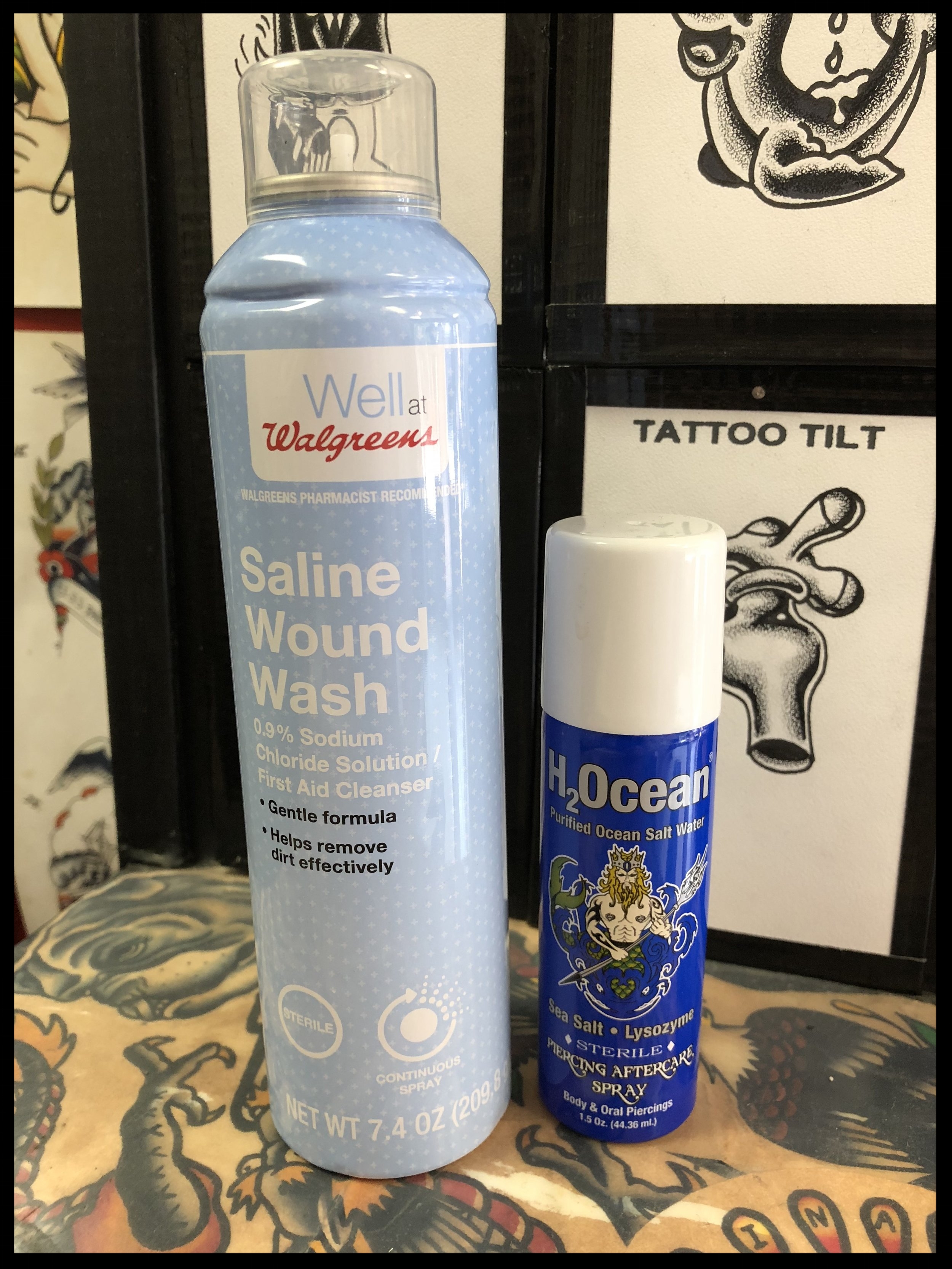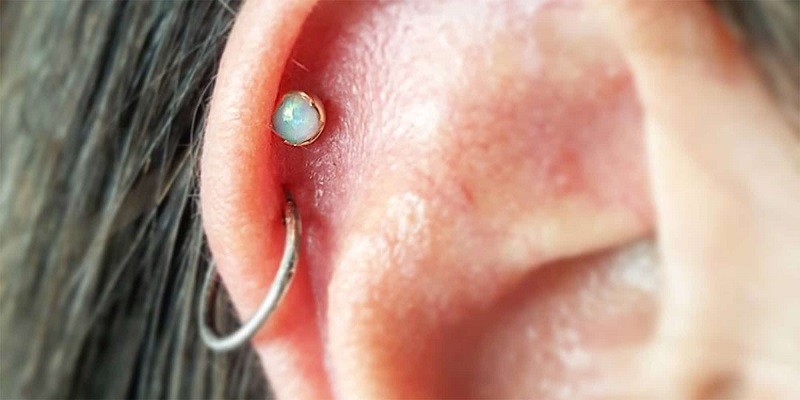Last Updated on September 13, 2023
Yes, you can clean your piercing with salt water, as it helps in preventing infections and promoting healing. Cleaning your piercing with a salt water solution, also known as saline solution, can help remove debris and bacteria, keeping the area clean and reducing the risk of infections.
Additionally, salt water can help soothe any irritation or redness around the piercing. It is important to use a sterile saline solution or make your own by dissolving a teaspoon of salt in a cup of warm distilled water. Regular cleaning with salt water can be beneficial during the initial healing period and until the piercing is fully healed.
The Benefits Of Cleaning Piercings With Salt Water
Cleaning piercings with salt water offers numerous benefits. It helps prevent infection, reduces swelling, and promotes faster healing. Salt water is a natural, cost-effective, and easily accessible solution for keeping your piercings clean and healthy.
Salt Water As A Natural And Effective Cleaning Agent
- Salt water solutions have been used for centuries as a natural remedy for various ailments, including wound healing and skin infections.
- When it comes to piercing care, salt water is considered a safe and effective cleaning agent due to its antimicrobial properties.
- The high saline content in salt water helps create an inhospitable environment for bacteria and other microorganisms, preventing infection.
- Cleaning your piercing with salt water allows you to maintain good hygiene without the use of harsh chemicals that may irritate or damage the delicate tissues around the piercing.
Proven Benefits Of Using Salt Water For Piercing Care
- Salt water solutions help cleanse the piercing by gently removing any debris or crust that may have accumulated. This reduces the risk of infection and promotes faster healing.
- The mild saline solution soothes the pierced area, providing relief from irritation, redness, and discomfort.
- Regular use of salt water can help prevent the formation of keloids or hypertrophic scars, common complications associated with healing piercings.
- Salt water has a drying effect on the wound, which can help reduce excess moisture and prevent the buildup of bacteria and fungi.
- Unlike some commercial piercing aftercare products, salt water is affordable, easily accessible, and can be prepared at home with just a few simple ingredients.
How Salt Water Helps In Reducing Inflammation And Promoting Healing
- Salt water acts as a natural antiseptic, killing harmful bacteria and preventing infection, which is crucial for proper healing.
- The saline solution helps to remove excess fluid from the pierced area, reducing swelling and inflammation. This allows the body’s natural healing processes to take place more efficiently.
- Salt water has osmotic properties, meaning it can draw out impurities and promote healing by increasing blood circulation to the wound.
- The gentle nature of salt water makes it suitable for all types of piercings, including but not limited to ear, nose, belly button, and lip piercings.
- The regular use of salt water during the initial healing period and as part of ongoing piercing care can significantly improve the overall healing process and minimize the risk of complications.
Remember, cleaning your piercing with salt water should be done with care. Always wash your hands thoroughly before touching the piercing and ensure the saline solution is prepared using clean, sterile water. If you experience any signs of infection or have concerns about your piercing, consult a professional piercer or healthcare provider for guidance.

Credit: newlifetattoos.net
The Right Way To Clean Your Piercing With Salt Water
Cleaning your piercing with salt water is a safe and effective method. Follow these guidelines for the right way to clean your piercing and promote proper healing.
Taking proper care of your piercing is essential to prevent infections and promote healing. One popular method for cleaning piercings is using salt water, also known as saline solution. In this section, we will provide step-by-step instructions for preparing homemade saline solution, teach you the proper technique for cleaning your piercing with salt water, and answer the question of how often you should clean your piercing with salt water.
Step-By-Step Instructions For Preparing Homemade Saline Solution:
- Dissolve 1/4 teaspoon of sea salt in 8 ounces of warm distilled water.
- Stir the solution until the salt is completely dissolved.
- Allow the saline solution to cool down to room temperature.
Proper Technique For Cleaning Your Piercing With Salt Water:
- Wash your hands thoroughly with warm water and antibacterial soap before touching your piercing.
- Gently soak a clean cotton ball or pad in the prepared saline solution.
- Place the soaked cotton ball or pad onto the piercing and leave it there for a few minutes to allow the salt water to penetrate.
- Gently remove the cotton and discard it. Do not reuse it to prevent cross-contamination.
- Use a clean cotton swab to gently clean around the piercing, removing any crust or debris.
- Rinse your piercing with warm water to remove any residue from the saline solution.
- Carefully pat the area dry with a clean, disposable paper towel.
How Often Should You Clean Your Piercing With Salt Water?
- Clean your piercing with salt water 2-3 times a day, preferably after washing your face or taking a shower.
- Avoid over-cleaning, as it can irritate the piercing and delay the healing process.
- Continue cleaning your piercing with salt water until it is fully healed, which can take several weeks or months, depending on the type of piercing.
Remember, maintaining good hygiene and cleaning your piercing with salt water can help prevent infections and promote faster healing. If you experience any signs of infection, such as increased pain, redness, swelling, or discharge, consult a professional piercer or healthcare provider for further guidance.
Precautions And Considerations When Using Salt Water For Piercing Care
Proper care is crucial when using salt water to clean your piercings. Make sure to follow these precautions and considerations to ensure optimal healing and minimize the risk of infections.
The Importance Of Using Sterile Water And High-Quality Salt:
- Using sterile water: When cleaning your piercing with salt water, it’s crucial to use sterile water to minimize the risk of infection. Tap water may contain bacteria or other contaminants that can further irritate your piercing. Boiling water or using distilled water are good options to ensure cleanliness.
- High-quality salt: The type of salt you use for your saline solution matters. Table salt, sea salt, or kosher salt are not recommended as they may contain additives or impurities. Instead, opt for non-iodized sea salt or piercing-specific saline solution available at reputable stores. These options are formulated to mimic your body’s natural pH balance and help promote healing.
Potential Risks And Side Effects Of Using Salt Water Incorrectly:
- Over-diluting the salt solution: Using too much water or too little salt can disrupt the natural balance of the solution, making it less effective in properly cleaning the piercing. It’s important to follow the recommended ratio of salt to water provided with your saline solution or seek guidance from a professional piercer.
- Under-cleaning or excessive cleaning: While cleaning your piercing is important, overdoing it can lead to irritation. On the other hand, neglecting to clean it regularly can also cause complications. Find a balance by cleaning your piercing 2-3 times a day, following the aftercare instructions provided by your piercer or a trusted source.
- Allergic reactions: Although rare, some individuals may be allergic to certain salts or additives found in saline solutions. If you experience excessive redness, swelling, itching, or any other signs of an allergic reaction, discontinue use immediately and consult a healthcare professional.
Taking Care To Avoid Allergies And Irritations:
- Patch test: If you’re using a saline solution for the first time, it’s a good idea to conduct a patch test by applying a small amount of the solution to a small area of your skin, away from the piercing. Wait for 24 hours and check for any adverse reactions before using it on your piercing.
- Avoid using excessive force: When applying the salt water solution, be gentle and avoid excessive force. Aggressively scrubbing or rubbing the piercing can cause irritation and delay the healing process.
- Rinse thoroughly: After using the salt water solution, make sure to rinse your piercing with sterile water to remove any residue. Failing to do so may leave salt deposits on the piercing, potentially causing further irritation.
Remember, proper piercing care goes beyond just using salt water. It’s essential to follow all aftercare instructions provided by your piercer and reach out to them or a healthcare professional if you have any concerns or complications. Your piercing’s health and healing process are unique to you, so it’s crucial to prioritize your individual needs.
Frequently Asked Questions For Can I Clean My Piercing With Salt Water?
Can I Just Use Salt Water To Clean My Piercing?
No, it is not recommended to clean your piercing solely with salt water.
What Can I Clean My Piercing With?
Clean your piercing with a saline solution or mild soap and water. Avoid harsh chemicals.
How Long Do You Soak A Piercing In Salt Water?
Soak your piercing in salt water for about 5-10 minutes, once or twice a day.
Does Salt Water Clean Infected Piercings?
Salt water can help clean infected piercings due to its antiseptic properties.
Can I Clean My Piercing With Salt Water?
Yes, cleaning your piercing with salt water is a safe and effective method. It helps to disinfect the area and promote healing.
Conclusion
Taking care of a new piercing is crucial for its proper healing. Salt water can be a popular choice for cleaning piercings due to its natural antibacterial properties. It helps to soothe any irritation, reduce swelling, and promote healing. The saline solution can be easily made at home by mixing sea salt and warm water.
However, it is important to remember that it should be used in moderation and not as a substitute for professional aftercare advice. Always consult with your piercer or healthcare professional before using any home remedies. Additionally, make sure to clean the piercing gently with clean hands or Q-tips, and avoid using any harsh chemicals or the overuse of salt water.
By following these guidelines, you can safely clean your piercing with salt water and aid in its healing process.




